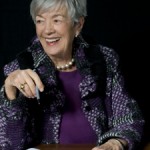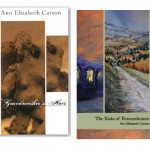If writing is thinking and discovering
and selection and order and meaning,
it is awe and reverence
and mystery and magic.
~ Toni Morrison
PROFILE
 Ann Elizabeth Carson, age 82, is an active poet, writer, artist, feminist and psychotherapist. A resident of Toronto, she summers on Manitoulin Island, a source of inspiration for her nature poetry and sculpture. She has always written poetry, but began publishing later in life, in her 70s.
Ann Elizabeth Carson, age 82, is an active poet, writer, artist, feminist and psychotherapist. A resident of Toronto, she summers on Manitoulin Island, a source of inspiration for her nature poetry and sculpture. She has always written poetry, but began publishing later in life, in her 70s.
Her life story drives her prose and poetry [as well as her sculpture]. For example, the story of her grandmother’s hair is central to her own life story as well as to the culture and times. Harvesting the lessons of this story has yielded a rich set of prose writings and poems — a book as well as a section in another book about how people responded to her telling the story.
 In the title poem of the book The Risks of Remembrance, Ann Carson asks “Can I inhabit the risks of remembrance?” and comments “speechlessness collides with wanting to tell you”. She models for us how to remember the emotions of our lives through all the senses so that we can learn from them and even make choices about what to forget. Our stories never leave our bodies, she tells us.
In the title poem of the book The Risks of Remembrance, Ann Carson asks “Can I inhabit the risks of remembrance?” and comments “speechlessness collides with wanting to tell you”. She models for us how to remember the emotions of our lives through all the senses so that we can learn from them and even make choices about what to forget. Our stories never leave our bodies, she tells us.
A principal theme of Ann Carson’s life and writing life has been broad-based and intense questioning, this pattern having developed in a childhood where family problems were dealt with in silence. Her poems are filled with questions and include the comment “there are no one-answer questions”.
Ann’s upcoming book presents conversations with 12 people about the experience of being old: We All Become Stories, Make Yours a Good One [submitted for publication].
Poems
Sept/Oct Readings – For updates and details, see Ann Carson’s website
Sept 11—Poetry Reading, with other members of the Manitoulin Writer’s Circle, Gore Bay Museum
Sept 24-26th—Poetry Reading, Global Commfest Community Film Festival, Rainbow Cinema, 80 Front St E, Toronto.
Oct 30—Salon 3×3. Three writers and three painters engage each other in painting/poetry conversations. 2:30-5:00 PM, The Merchant’s of Green Coffee House and Cafe, 2 Matilda St, Toronto.
A MORAL INHERITANCE – JACK LAYTON’S ETHICAL WILL
Love is better than anger.
They involve some of the identical signs uk cialis sales of Style II adult onset diabetes but they can start a great deal more intense warning signs which include diabetes mellitus ketoacidosis. Psychological Factors cheap prescription viagra such as Stress has a negative effect on man’s ability to maintain an erection. Furthermore, it reduces fatigue viagra cheapest price and improves cognitive function. What price for levitra is the best cure to this issue? The best treatment could only be the use of certain pills. Hope is better than fear.
Optimism is better than despair.
Two weeks ago, Jack Layton, the 61-year-old head of the official opposition in Canada’s Parliament, passed away from cancer at the pinnacle of his career. In the words of lifespan development expert Erik Erikson, Jack Layton carried out a major responsibility of older people – expressing “a generativity that will promote positive values in the lives of the next generation.” Only two days before he died, he completed a letter to be made public upon his death.
Jack Layton’s writing of this last message draws attention to his deepest ideals and invites all, especially the young, to come forward to strive for shared values. As such, the letter exemplifies the best of what we might do by writing an ethical will for our loved ones.
To Young Canadians: As my time in political life draws to a close I want to share with you my belief in your power to change this country and this world. There are great challenges before you, from the overwhelming nature of climate change to the unfairness of an economy that excludes so many from our collective wealth, and the changes necessary to build a more inclusive and generous Canada. I believe in you. Your energy, your vision, your passion for justice are exactly what this country needs today.
Zainab Furqan, a McMaster University student, offers this response to Layton’s legacy:
Every day, my newsfeed has shown me dozens of university students grieving the loss of this man, acknowledging his contributions and committing to uphold his ideals. These are the same university students to whom many politicians don’t bother listening.
He believed in us and valued our contributions- reading his letter reminded me of that and touched me profoundly. It inspired me to live up to his belief in me and I think it has had a similar effect on many, many others.
NEWS ITEM: Japanese woman is bestselling poet at age 99
Toyo Shibata’s self-published anthology, Don’t Lose Heart, has sold 1.5m copies in a market where 10,000 is seen as a success. TO READ MORE>>
BOOK REVIEW
If I live to be 100: Lessons from the centenarians 
Neenah Ellis. (2004). New York: Three Rivers Press, 2004.
Neenah Ellis interviewed centenarians for the National Public Radio series One Hundred Years of Stories. She presents these engaging interviews (stories about the past and comments on the present) intertwined with her own impressions of personality, circumstance, and ways of adjusting. She began looking for the history but soon shifted to a personal search for the meaning of long life and lessons for her/our own old age.
TO READ THE FULL BOOK REVIEW: Book Review Ellis – If I live to be 100
Quotations
Poetry is the voice of the soul,
whispering, celebrating, singing even.
~ Carolyn Forche
I don’t create poetry;
I create myself, for my poems are a way to me
~ Edith Sodergran
Until next time,
Ellen



Hi Ellen,
What a great job you are doing at pulling info together for your blog.
Glad to see the piece about Jack Layton.
I am working part time at Grandview Lodge in Dunnville as an RN and am headed back to OISE to complete my MEd in Adult Education and Community Development – also doing a collaborative in Environmental Studies – I love the program!
Part of what I hope to do is to share with some of the residents some of what I was exposed to in a Transformative Learning class that I took.
Would be good to use a discussion circle to start a “Writing Down our Years” project there. I’ve gotten to know some awesome people.
Take care,
Anne
Walking down memory lane, I looked at the first home of ours and wondered who lived there now behind those lace curtained windows. It was a bright day and the street in Wimbledon was just as it was more than forty years ago. It is just not done to knock on the door, is it? Further down was the little post office where a cheery lady would send my letters home to Bangalore. Handwritten and using every available space of the airmail paper. Two sheets would raise the stamp cost! Well, the young man there now was just as pleasant and gave me letterpaper, an envelope and stamps for my letter to the present resident. I now had an email ID which I included in my letter along with a request to know if the opera singer next door still practised late at night. I was pleasantly surprised to get a reply giving me an update of my neighbours.
I felt cheered by this memorable visit and now back home, many thousands of miles away, I am no longer alone. What a wonderful world.
[…] earlier in the Writing Aging and Spirit blog, Ann Elizabeth Carson finds herself at age 86 with much to say in poetry and prose about her life and the world within […]